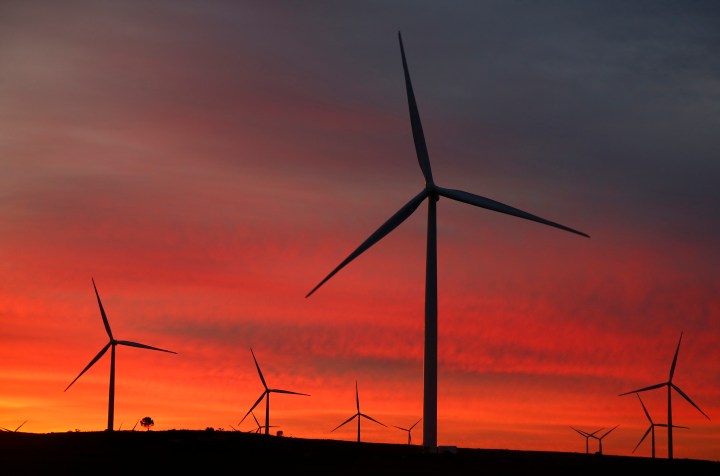CLEAN BREAK FROM EISHKOM
Get a load of this – these South African cities have a plan to ditch Eskom and end power cuts

Metro leaders have moved beyond simply complaining about the incessant blackouts and are partnering with the private sector to find solutions.
As Eskom load shedding prevails, some cities are turning to the private sector to solve the crisis, with much interest being shown in renewable energy projects.
Cities including Johannesburg, Cape Town and eThekwini are trying to tackle dire energy shortages while also meeting environmental commitments.
Michael Sun, Johannesburg’s mayoral committee members for the environment and infrastructure services, told the Joburg Energy Indaba that in 2022 load shedding had cost the country between R60-billion and R120-billion.
“Now you can imagine, if we could use that money, that we suffered as a loss, in building our economy, investing in infrastructure,” said Sun.
Here’s what’s happening in three of South Africa’s major cities.
Johannesburg
The City of Joburg held its first Energy Indaba on 23 May, aimed at finding sustainable and affordable solutions to the energy crisis. Mayor Mpho Phalatse said: “We cannot assume any more that our power will be solely generated by Eskom. Instead, more and more alternative energy models have come through and, as the City, we are forced to recognise so-called embedded generation as a serious option.”
The indaba aimed to engage with businesses and the government to find a way to reduce the city’s 90% energy dependence on Eskom and find a permanent solution to load shedding.
Eskom uses mostly fossil fuels, as does independent Kelvin Power Station, from where the municipality gets the remaining 10% of its power, and the city council is keen on “clean” alternatives.
In the short term it wants a 28% reduction in carbon gas emissions, and has a longer term goal of zero emissions by 2050. Technologies identified include solar, battery storage, waste-to-energy and gas.
“Clean energy provided by independent power producers will not only improve the City’s energy security, but also respond positively to the climate change imperative,” said Phalatse.
But to achieve energy security, the City needs help.
Phalatse said the capital budget for the next financial year, starting in July, was R7.7-billion (inclusive of all other capital infrastructure needs, not just power), which is not enough to provide energy security, so the private sector was being sounded out for funding.
For example, City Power has a plan to stabilise power supply by 2030 at a cost of R26-billion. Fast-tracking that plan requires money from other sources.
Phalatse revealed there was already a lot of interest from the private sector.
“It’s almost as if all people in the energy space have been waiting for the City to provide the leadership to convene them,” she said.
The Joburg multiparty coalition government’s energy stance is premised on the Sustainable Energy Strategy – which includes leasing land to independent power producers (IPPs), wheeling (acquiring power from other grids) and small-scale generators. Phalatse said diversifying energy acquisition would make it much cheaper because of competitive pricing.
The City has made prospective partners aware that a key objective is to provide affordable energy to residents, and Phalatse acknowledged that non-payment is a problem in areas such as Soweto and Ivory Park.
“We would love to see our residents, including the poorest of the poor, able to access cheap energy from the City through our various partnerships.”
Cape Town
Cape Town mayor Geordin Hill-Lewis told DM168: “Public-private partnerships, and private sector innovation especially, will be key to securing Cape Town’s energy future, through increasing the reliability of electricity supply to end load shedding, adding cleaner energy to the mix and making electricity more affordable for Capetonians.”
As it stands, Cape Town buys 99%-plus of its electricity from Eskom for onward sale to consumers via the City’s grid.
Hill-Lewis said the City was working on building small-scale embedded generation, independent power producer programmes and wheeling to help to achieve municipal energy independence and energy security built on sustainability.
In its draft energy budget, the City has R15-million to pay for small-scale embedded generators – ground- or rooftop-mounted solar PV systems at residential, commercial or industrial sites such as electricity depots and wastewater treatment plants.
The municipality announced: “We are promoting renewable energy along with projects aimed at enabling the establishment of the IPP sector to ensure energy security and a cleaner future.”
Hill-Lewis said the tender process for the first round of IPP procurement was under way.
In line with its carbon-neutral and energy-security commitments, the City of Cape Town is looking for IPP projects within the city boundaries.
In addition to the goal of diversifying energy supply and providing reliable generation, the City launched a pilot electricity wheeling project this month, with potential third-party suppliers able to apply until 30 June.
Wheeling involves a third party supplying energy that is “wheeled” through the Eskom grid to the City’s grid and, finally, to the consumer.
eThekwini
Msawakhe Mayisela, spokesperson for the eThekwini Metropolitan Municipality, told DM168 the city council had adopted an Energy Transition Policy in June 2021 to mitigate the heavy impact of load shedding on Durban’s economy.
The policy envisages an integrated municipal energy system, with 40% of required electricity being obtained from renewable energy sources by 2030, and 100% by 2050 – thereby reducing reliance on Eskom and fossil fuels.
In July 2021, eThekwini released a request for information to the market for the procurement of 400MW of new generation from IPPs, in line with the Energy Transition Policy.
Mayisela said plans for 104 projects were received, representing a combined capacity of 16.5GW, with R10-billion worth of private investment anticipated and the majority of these projects able to reach commercial operation by July 2025.
The City was finalising concurrence processes with Treasury and the departments of cooperative governance and economic development to procure new generation capacity.
The big switch-off: This is eThekwini’s vision to dump Eskom
“Local government is still a highly regulated sphere and requires careful assessment of skills and capacity to manage a project of this magnitude.
“Our goal is to provide regional transformation in the energy sector, working together with all districts in KwaZulu-Natal. Our intention is to increase economies of scale and create much-needed investment in the energy sector. Energy security interventions will be used as catalysts for economic growth and job creation while reducing municipal bulk operating expenditure.”
Mayisela said the Department of Mineral Resources and Energy had a process for finalising Section 34 “ministerial determination”. This process was beyond the City’s control and could take up to three months.
“We remain hopeful that electricity supply constraints will soon be a thing of the past in eThekwini Municipality.” DM168
This story first appeared in our weekly Daily Maverick 168 newspaper, which is available countrywide for R25.

[hearken id=”daily-maverick/9588″]
[hearken id=”daily-maverick/9419″]





















 Become an Insider
Become an Insider
Who wouldn’t be eager to contribute to solutions like residential rooftop solar and community batteries to overcome the disaster that ESKOM has become? Let’s go!
Methinks Eskoms quietness on the subject will be revealed when the tax on independent power raises its unbelievable head.
Its going to be good if we all know our rights and be able to stand legally against taxing independence from the parastatal.
Wendy : I hope I am right but it is very hard to see how authorities will tax private power. What they can have certainly already done is redesign their tariffs. So before you paid R125/peak kVA and 250c/kWh. Because you now generate more kWh than you consume, they change you to R350/peak kVA and drop your kWh charge to 105c which is less than they actually pay Eskom per kWh. Entirely illegal but it takes you years to fight it. We should all get ready for tariffs that target solar power.
somebody really needs to unpack the rationale of cities getting away with a lower level of loadshredding because of a degree of private power. If a city normally has a GW of peak demand loads it would normally shed about 100MW per 2h during loadshredding. If it now organizes a 100MW of IPP it should still shred 90MW per 2h loadshredding. Only if its IPP can step up from 100 to 200 MW can it claim to offset a stage to shred 100MW. Even worse is CPT claiming a stage less with Steenbras. They are not reloading Steenbras with private power they are taking 220MWh from the grid to draw 180MWh – that 220MWh is drawn while the rest of the country is being shredded. If they did have private 220MWh they would in any event get ONE 2h slot of one stage less per day, not a stage less the whole day! I have storage that I fill with solar, nobody is offering that I get a stage reprieve from shredding despite my filling my storage with my own power and my being able to run all of my loads from storage.